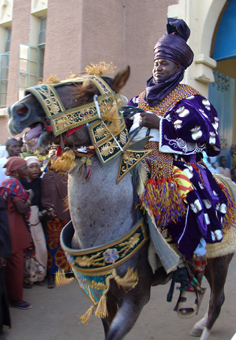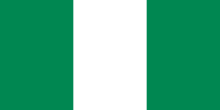Ɗan Nijeriya
Dan NajMacea Namiji Ko 'Yar Nijeriya Mace, 'Yan Nijeriya, ko Mutanen Nijeriya mutane ne dake zama a Nijeriya ko kuma suke da tarihin kakanninsu daga Nijeriya.[1] Nigeriya na tattare da al'ummomi, da kabilu da al'adu daban-daban kuma Kalmar ta Ɗan/Yar/Mutanen Nijeriya na alakanta yan ƙasar ne, kamar yadda dokan tabbatacin zama dan ƙasa ya nuna.[1] Nigerians derive from over 250 ethnic groups and languages.[2] Dukda akwai al'ummu daban-daban a Nijeriya, Harkokin neman kudi yataka muhimmin rawa wurin yawace yawacen al'ummu daban-daban mabanbanta addini wurin yawo daga wannan bangare zuwa wata bangaren, daga Nijeriya, wanda yasamar da haduwa da cakudewar mutanen, musamman wadanda suke zaune a birane sune abun yafi shafa.[3] Sama da kashi 50 na Mutanen Nijeriya Muslimai ne wanda sauran kashin na kasa da 50 akwai Kirista da masu bin addinin gargijiya da sauransu.[4][5]

| Wannan shafin yana ƙunshe da Kalmomin wani harshen da ba'a gama fassara su ba, ka taimaka wajen fassara su.!
|
| yawan mutane | |
 | |
| Bayanai | |
| Ƙaramin ɓangare na |
inhabitant (en) |
| Ƙasar asali | Najeriya |
| Suna saboda | Najeriya |
| Ƙasa | Najeriya |
| Ƙasa da aka fara | Najeriya |
| Yadda ake kira mace | нигерийка |
| Yadda ake kira namiji | нигериец |
| Wuri | |
| Ƴantacciyar ƙasa | Najeriya |


Yan Nijeriya mutane ne da suke daga alummu da kuma addini daban-daban kasantuwar ƙasar an kirkire ta ne sanadiyar mulkin mallaka na turawa da Daular Biritaniya wanda bata da wani alaka da kabila ko addinin wurin mulkin ta.[4]
Akwai manyan ƙasashe dake da tarihi a Nijeriya wadanda sun taimaka wurin kasancewar Nijeriya ta hannun Sarakuna da irin dokoki da yanayin tsarin harajinsu, da kuma amfani da addini a wurin yardar da kafin Sarakan da hadin kan jama'arsu.[6] Arewacin Nijeriya takasance tasamu canji a al'adunta ta irin canjin da musulunci yakawo a Yankin, da samun manyan daulolin kasashen Musulunci a yankin.[6] Daular Kanem-Bornu da Masarautar Sokoto sunkasance manyan kasashen Musulunci a tarihin Arewacin Nijeriya.[6] Kudancin Nijeriya a tarihi suma sunada daulolin kasashe masu kafi kamarsu Daular Benin da Daular Oyo, kasashen Ife da wasu daga cikin kasashen Yarbawa.[6]
Al'adun Nijeriya was profoundly affected by the British colonial rule.[7] Such as British colonial authorities' denouncements and attacks upon polygamy, trial by ordeal, and certain types of sacrifices.[7] At the same time, British colonial authorities maintained and promoted traditional Nigerian culture that strengthened colonial administration.[7] The British spread Christianity throughout southern Nigeria and Christian missionaries assisted British authorities in establishing a Western-style education system in Nigeria that resulted in the teaching of the English language in Nigeria and its subsequent adoption as Nigeria's main language.[7] The British replaced unpaid household labour with wage labour.[7] Prior to colonization in the twentieth century, Nigeria's tribes usually possessed the land as a community, such that land could not be bought or sold.[8] Colonization brought the notion of individuals owning land and commercialization of land began.[8]
In Nigeria a majority of seventy percent of Nigerians live in villages of two types: the first type used by the Igbo and Tiv involves a collection of dispersed compounds, the second type used amongst the Hausa, Yoruba, and Kanuri involves nucleii of compounds.[5] These villages compose members of the ethnicity-related through ancestry as well as strangers who have been assimilated into the ethnicity.[5] Since the time prior to colonization to the present it has been common practice of Nigeria's tribes to adopt strangers into the tribes.[8] A male elder commonly serves as a village chief.[5]
A manyan biranen Nijeriya, there is substantial intermingling of Nigerians with foreigners, especially Europeans, Lebanese, and Indians.[3] The economic importance of Nigeria's cities has resulted in migrations of people from their traditional ethnic or cultural homeland to cities outside those territories.[3] Igbo and Ibibio people have commonly migrated to Lagos and many southerners migrate to the north to trade or work while a number of northerner seasonal workers and small-scale entrepreneurs go to the south.[3]
Ethnic, religious, and regional disputes and tensions have commonly divided Nigerians on political issues.[9] In particular, cultural and political divisions between the Muslim north and the Christian south has politicized religion and caused significant political disputes in Nigeria.[9] Ethnic-motivated and religious-motivated violence by extremists has increased these tensions as well.[4]
Dukda dai, anrika samun wasu masu saurin ra'ayi, yan'Nijeriya sun cigaba da zama lafiya a tsakanin su, and a common Nigerian identity has been fostered amongst the more-educated and affluent Nigerians as well as with the many Nigerians who leave small homogeneous ethnic communities to seek economic opportunities in the cities where the population is ethnically mixed.[4] Although there are cultural divisions amongst Nigerians, Nigerians commonly use the English language as their primary language.[4] Also, most Nigerians share a strong commitment to individual liberties and democracy.[4] Even during periods of military rule, such military governments were pressured to maintain democratic stances by the Nigerian people.[4] Nigeria's political figures commonly know multiple indigenous languages outside their own indigenous language.[4]
- Al'adu
-
Matan Hausawa
-
Yan Nijeriya na cin kasuwa a wata babban shago a Lagos
-
Yarbawa daga Kwara sanye da kayan al'adu suna kida
-
Mutane akan dawakai a Hawan Daba a Kano
-
Mutanen Ibo, sanye da Isiagu na zamani da hulunan al'adar Ibo
-
Wani Eyo Iga Olowe Salaye a tsallen masquerade
.
Manazarta.
gyara sashe- ↑ 1.0 1.1 April A. Gordon (2003). Ethnic diversity within nations. Santa Barbara, California, USA: ABC-CLIO, Inc. p. 233. ISBN 1576076822.
- ↑ Toyin Falola. Culture and Customs of Nigeria. Westport, Connecticut, USA: Greenwood Press, 2001. p. 4.
- ↑ 3.0 3.1 3.2 3.3 Toyin Falola. Culture and Customs of Nigeria. Westport, Connecticut, USA: Greenwood Press, 2001. p. 8.
- ↑ 4.0 4.1 4.2 4.3 4.4 4.5 4.6 4.7 April A. Gordon. Nigeria's Diverse Peoples: A Reference Sourcebook. Santa Barbara, California, USA: ABC-CLIO, 2003. p. 233.
- ↑ 5.0 5.1 5.2 5.3 Toyin Falola. Culture and Customs of Nigeria. Westport, Connecticut, USA: Greenwood Press, 2001. p. 6.
- ↑ 6.0 6.1 6.2 6.3 Toyin Falola. Culture and Customs of Nigeria. Westport, Connecticut, USA: Greenwood Press, 2001. pp. 15-16.
- ↑ 7.0 7.1 7.2 7.3 7.4 Toyin Falola. Culture and Customs of Nigeria. Westport, Connecticut, USA: Greenwood Press, 2001. p. 18.
- ↑ 8.0 8.1 8.2 Cite error: Invalid
<ref>tag; no text was provided for refs namedToyin Falola 2001. pp. 4 - ↑ 9.0 9.1 April A. Gordon. Nigeria's Diverse Peoples: A Reference Sourcebook. Santa Barbara, California, USA: ABC-CLIO, 2003. p. 111.
.





